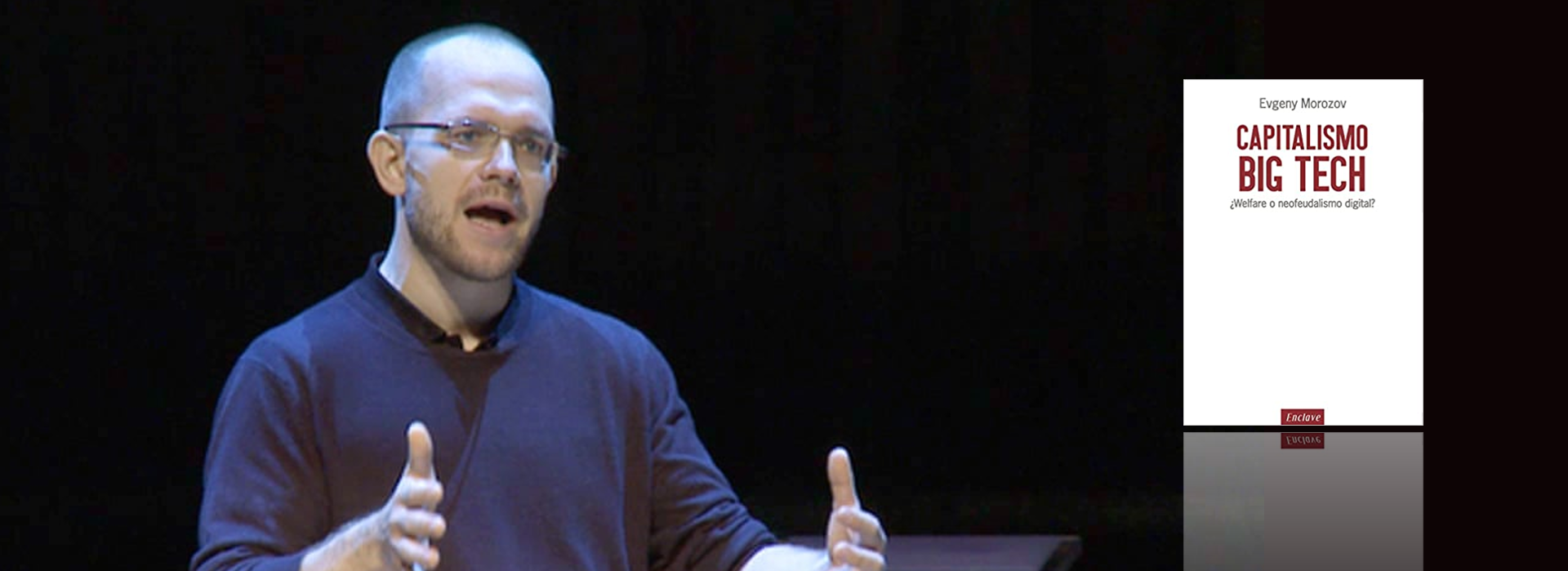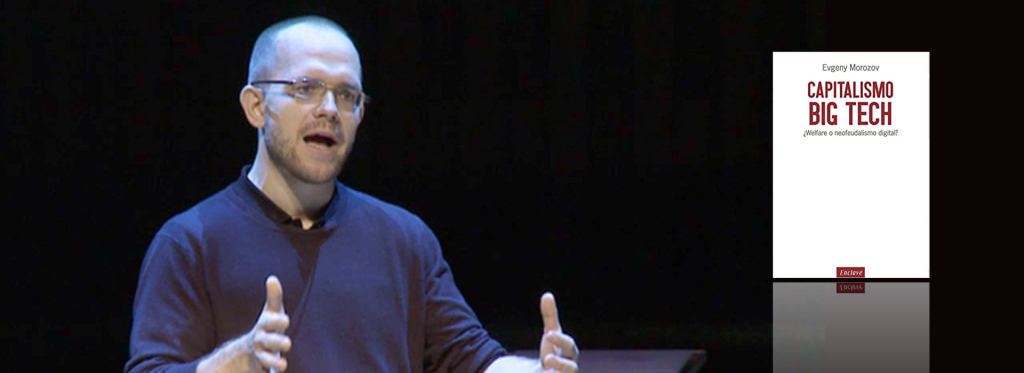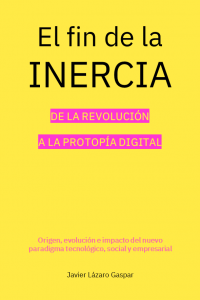BIG TECH CAPITALISM by Evgeny Morozov

‘Big Tech Capitalism: Welfare or Digital Neofeudalism?’ came to me as a response to ‘The End of Inertia’. A reader decided to engage in the debate I propose by sending me this book, which I sincerely appreciate.
‘Big Tech Capitalism’ shares many of the issues I describe in ‘The End of Inertia’ but does not approach them in the same way, as its author starts from an explicit opposition to the techno-utopian messages that seem to surround him. It may be my personal bias, but I feel that I am surrounded by techno-dystopians or techno-skeptics. This made reading it very stimulating.
Sometimes it is more enriching to read those with whom you disagree than those with whom you agree, especially if it is an essay as interesting as Evgeny Morozov’s.
The Author: Evgeny Morozov
Born in 1984 in Soligorsk (Belarus), he is a researcher and writer studying the political and social implications of technology. Prior to this essay, Evgeny published ‘The Net Delusion: The Dark Side of Internet Freedom’, ‘The Internet Delusion’, and ‘The Madness of Technological Solutionism’.
In addition to being a professor at various universities, he has contributed to publications such as The New York Times, The Wall Street Journal, El País, and The Guardian. The majority of the content of this essay is drawn from the latter.
If you want to hear some of this author’s ideas firsthand, I recommend this interview in El Mundo (5-minute video) titled “Evgeny Morozov: the heretic of the Internet.”
The Essay: ‘BIG TECH CAPITALISM: Welfare or Digital Neofeudalism?’
Evgeny Morozov’s book is an interesting selection of 27 articles that the author had previously published (between 2011 and 2017) in The Guardian. These articles address topics of interest such as power concentration, data economy, universal basic income, net neutrality, collaborative economy, fake news, cybersecurity, etc. All under his vision of economy, society, and politics.

BIG TECH CAPITALISM by Evgeny Morozov
The fact that it is a collection of articles developed over 7 years gives it interesting value. It can be read as a diary of personal reflections on technology, politics, economy, and society in a specific historical context. Reading it requires the effort to situate oneself in the moment it was written, from 2011 (a year still marked by the 2008 financial crisis) to 2018.
Each of Morozov’s articles begins with provocative titles such as “Who pays for us to navigate the Web?”, “Who is the real enemy of freedom on the Internet: China, Russia, or the United States?”, “Silicon Valley talks about ‘basic income’ but these are empty words,” or “Beware of the ‘empathetic laundering’ of those who want to pass themselves off as ‘socially responsible capitalists’,” etc. In its development, Morozov maintains a provocative tone while developing his political, economic, and social vision, incorporating continuous references and examples from Silicon Valley.
The essay, published in 2018, is complemented by 2 additional unpublished texts and aligns with some ideas from other techno-skeptical authors also described in this blog, such as: Who Controls the Future? by Jaron Lanier and Technology vs. Humanity by Gerd Leonhard.
Some Key Ideas
According to the essay, the tech industry, personified in GOOGLE (ALPHABET), APPLE, FACEBOOK, AMAZON, and MICROSOFT (known by the acronym GAFAM), is shifting from an economy based on free goods and services to a pay economy where the user must pay for each good and service.
In his articles from the early years, Evgeny Morozov argues that the enormous growth of these companies, primarily located in North America (as the years progress, he incorporates references to China), has occurred during the economic recovery from the 2008 financial crisis. These companies have allowed institutions and citizens to supplement their budgets and incomes through new sources of revenue or a reduction in their costs.
In this context, he highlights how companies like Airbnb and, above all, Uber have managed to reduce the costs of a service through clearly subsidized rates. The real currency of exchange is user data and precarious labor with high instability and inequality. For citizens who become drivers or rent out their homes, it is a way to supplement their income.
To reach the point where these 5 Big Tech (GAFAM) lead the capitalization lists, their financing has been necessary from everyone. Being American, according to Morozov, they have relied on funds from the Pentagon, universities, and other American institutions.
According to the author, in their growth, these companies have moved from promising a transformation of the capitalist system towards a technological post-capitalism to clinging to the capitalist principles of the large companies of the past that they sought to transform. This unfulfilled expectation is extensively described in the essay and can be reflected in paragraphs such as the following.
“These hopes for a structurally transformative digital revolution, which are deeply rooted, are shared across the political spectrum.”
“Was the promise of emancipation implicit in the first cyberculture genuine? Could things have turned out differently, with citizens taking control?”
Evgeny Morozov, Big Tech Capitalism
What oil meant in past capitalism is, for Morozov, the flow and ownership of data in the digital age. To achieve ownership of data, these companies have heavily subsidized the goods and services they offered. There has been no visibility of the real (monetary) production cost of these goods and services, leading us to an economy where value is produced through data accumulation and the creation of Artificial Intelligence leveraging this data.
In this evolution, the ultimate financiers of this economy, venture capital investors from Silicon Valley, are demanding a shift where these companies move from subsidized models (directly or through advertising) to models where the customer pays for it. The advertising business is described by Morozov as a lesser evil from which companies like Google or Facebook are trying to escape by seeking new revenue streams.
For example, the term smart city is described in ‘Big Tech Capitalism’ as a new way for tech companies to generate income by applying personalized prices to citizens for the goods and services they consume through sensors and Artificial Intelligence.
“Smart city (…) means that our urban infrastructure will be handed over to a group of tech companies (certainly not very prone to transparency), who will then manage it as they see fit, making it almost impossible to remunicipalize it later (…).”
Evgeny Morozov, Big Tech Capitalism
All of this coincides with a moment when technological advances allow reducing the need for labor thanks to, above all, automation and Artificial Intelligence. To make the system sustainable, these large companies require all their customers to have sufficient income to finance these basic services, which is incompatible with the growing level of automation. This is, according to Morozov, the reason why large tech companies advocate for a universal basic income that allows their users to have sufficient resources to consume the digital services these companies offer.
The author compares the situation of the tech industry to that of a fishbowl in which the fish keep swimming before dying.
“Despite what many experts believe, the well-being of the invisible bacteria in the aquarium is much more important than the chemistry of the fishbowl, more important, for example, than the temperature, pH levels, or traces of metals. If these bacteria die, the fish will also end up dying, even if they can still keep swimming for a while, to the bewilderment of external observers.”
Evgeny Morozov, Big Tech Capitalism
Nevertheless, his view is not equally negative regarding all advancements. Regarding the Internet, as the infrastructure upon which all previous businesses and technologies develop, he adopts a more open stance. For him:
“(…) The Internet is not a sharp, high-resolution photo of reality; it is more like an ink blot from a Rorschach test, so that depending on who sees the image and what their political and ideological agenda is, they will draw very different lessons from it.”
Evgeny Morozov, Big Tech Capitalism
Returning to his initial question about the popular sovereignty of technology, Morozov believes it is a reversible process, albeit complex.
“Can citizens regain popular sovereignty over technology? Yes, but only if we first regain our sovereignty over the economy and politics.”
Evgeny Morozov, Big Tech Capitalism
Conclusions and Opinion
‘Big Tech Capitalism’ begins with a statement of intent from the author.
“In this essay, I argue that (…) it is much more likely that, in the long run, the only thing that will make its growth [that of the tech industry] is to multiply the contradictions of the current system and make many of its elements, relationships, and practices even more hierarchical and centralized.”
Evgeny Morozov, Big Tech Capitalism

Evgeny Morozov, Big Tech Capitalism
Believing that there are reasons to be alert and sharing the need to impose limits on the concentration of power in any sector, especially those that are more strategic, including technology; I think that demonizing tech companies does not solve any problems. Nor does it resolve the issue to consider technological evolution as something negative and with an independent life from that of the humans who use it.
From Europe, we must ask ourselves why none of these companies are European and question the technological dependency we have on the United States and, although not mentioned in the essay, on China. As users, companies, associations, and administrations, what responsibility do we have regarding the technology we use?
We cannot forget all the positive aspects of a society where technology enhances us, and therefore I do not share the author’s skeptical view, although I do agree on the necessity of ideals that transcend technology. As I argue in ‘The End of Inertia’, technology and data are not a barrier to fulfilling our ideals but a means.
In conclusion, it is an essay of nearly 300 pages that is easy to read, containing very interesting and necessary reflections (whether or not you agree with the author’s conclusions). I think it is a good way to continue the debate on where the digital revolution is leading us: will it be towards a dystopia, a utopia, or a digital protopia?
Evgeny Morozov is clear, and so am I. We do not agree, but, as always, I do not rule out being a fool as defined by Carlo M. Cipolla (see post The Laws of Human Stupidity in which a fool is defined as someone who harms others and themselves with their stance). The debate remains open.
If you are interested in these matters, I recommend taking a look at “The End of Inertia,” a popular essay on technology and its impact on society and businesses.

The End of Inertia
References
- BIG TECH CAPITALISM: Welfare or Digital Neofeudalism? by Evgeny Morozov
- The End of Inertia: From Revolution to Digital Protopia. Javier Lázaro
- Who Controls the Future? by Jaron Lanier
- Technology vs. Humanity by Gerd Leonhard
- The Laws of Human Stupidity by Carlo M. Cipolla
Guns N’ Roses
In 1990, Guns N’ Roses were above good and evil. That year, the band led by Axl and Slash released ‘Use Your Illusion I’ with anthems like ‘November Rain’, ‘Don’t Cry’, and ‘Live and Let Die’, among others.
31 years later, Spotify (a European tech company) tells me that ‘November Rain’ is one of the songs I listened to the most in 2021, but sorry Spotify, you got it wrong this time. It wasn’t me but one of my 10-year-old children.
Just to celebrate this mistake (and Ferran’s good taste), it was worth writing this post.
Related posts

From COBOL to Agentic AI: Transforming the Software Lifecycle
Evolution of the software lifecycle applying AI and Agentic AI

Digital Transformation: Beyond Technology
In Digital Transformation, purpose and culture are more important than technology itself.

PROTOPÍA: get familiar with the term
> "Let's avoid the DYSTOPIA (...) > "Let's avoid the DYSTOPIA (...)
All opinions expressed on this blog are personal and do not represent those of any company or organization with which I collaborate.
